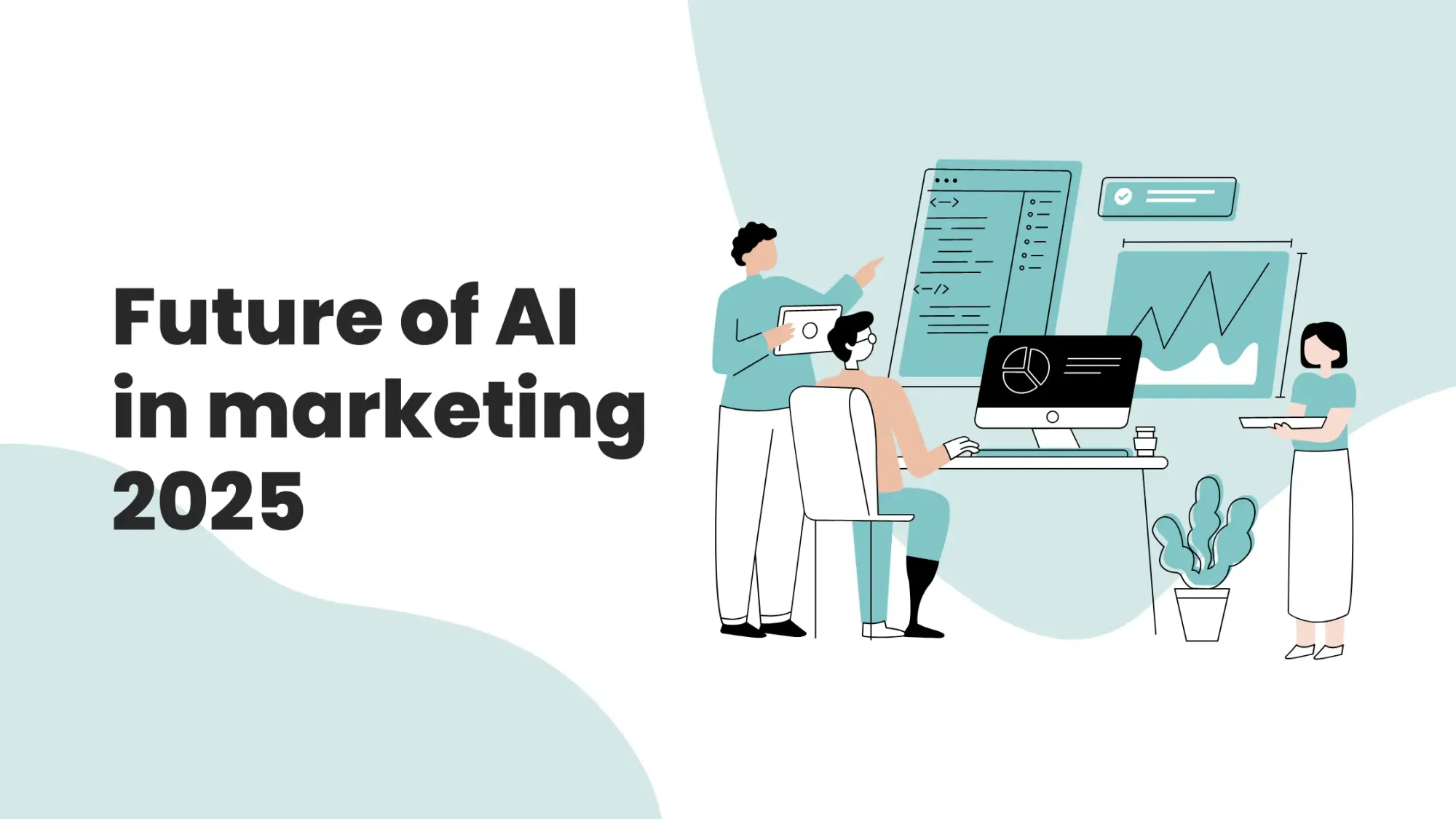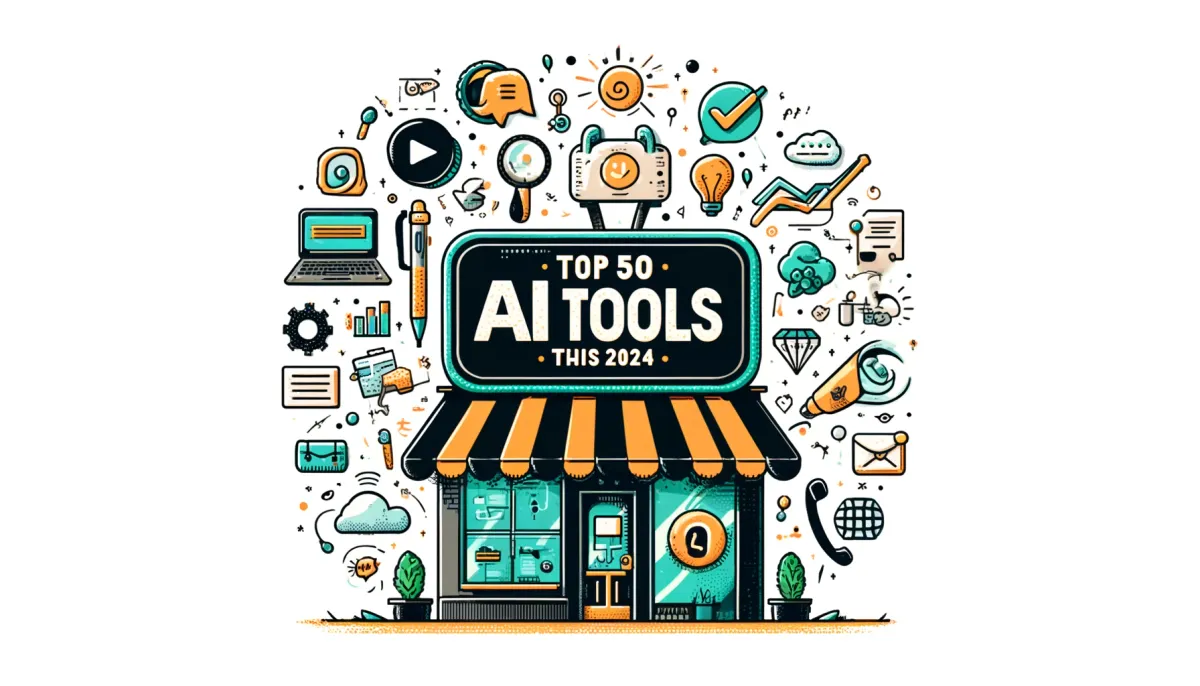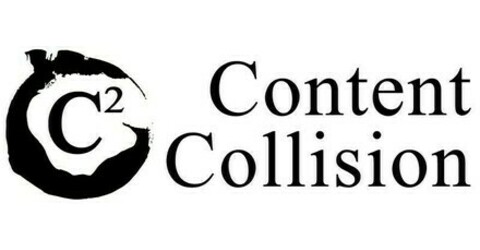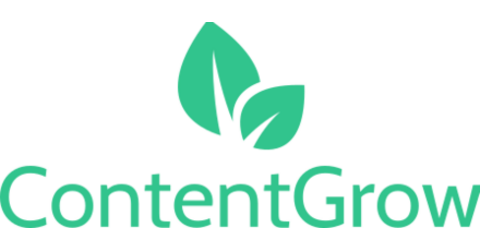Future of AI in marketing 2025
Discover AI marketing's future in 2025 with predictions on automation, personalization, decision-making, emerging tech, and ethical challenges.

By 2025, AI is expected to transform the marketing industry through advancements in automation, personalization, and decision-making. This transformation promises to streamline operations, enhance customer experiences, and drive strategic insights, making AI an indispensable tool for marketers.
However, this technological shift also brings about significant ethical considerations and workforce implications that businesses must navigate.
In this article, we delve into the predictions for AI marketing in 2025 and beyond. We'll explore how AI will automate routine tasks, elevate personalization, and enhance decision-making processes. Additionally, we'll discuss emerging AI technologies and how to address the ethical challenges and workforce impacts that come with AI integration.

Predictions for AI marketing in 2025 and beyond
As we look toward 2025, the landscape of AI in marketing is set to transform significantly, driven by advancements in automation, personalization, and decision-making.
1. AI automation increases
One key trend is the increasing use of AI to automate routine tasks. By 2025, it's predicted that AI chatbots will manage up to 85% of customer interactions without human intervention, enhancing efficiency and customer service by providing quick and accurate responses to common inquiries.
We can already see companies like Photobucket who utilizes Zendesk bots to handle frequently asked questions and streamline customer interactions, significantly improving their response times by 14% and customer satisfaction ratings by 3%.
2. Personalization will advance into new heights
Personalization will also reach new heights. AI will enable more tailored marketing campaigns by analyzing customer behavior and preferences. This will allow businesses to deliver highly personalized experiences, from product recommendations to targeted advertisements, significantly boosting customer engagement and satisfaction.
Several tools are already taking AI personalization to new heights. Jasper.ai, for instance, has become a comprehensive marketing tool that assists with various stages of content creation, including personalized content generation.
3. Decision-making will involve AI even more
Additionally, AI's role in decision-making processes will become more prominent. By 2025, AI-driven tools will be integral to business strategies, helping leaders make data-informed decisions with greater accuracy. These tools will optimize various aspects of operations, from financial forecasting to supply chain management, thereby reducing costs and improving efficiency.
Leveraging AI for business intelligence, ClickUp AI assists teams in visualizing and interpreting data to make informed decisions. The platform supports data visualization, predictive analytics, and automated report generation, making it easier for businesses to glean actionable insights from their data.
4. Ethical considerations and governance on AI will be more important
Furthermore, as AI's influence grows, ethical considerations and governance will become crucial. Companies will need to establish clear policies and ethical guidelines to ensure the responsible use of AI, protecting consumer rights and data privacy. This will likely involve forming AI ethics committees and adhering to stricter regulations.
According to the World Economic Forum, legislative interest in AI is increasing significantly. In 2022, legislative bodies in 127 countries passed AI-related laws, up from just one in 2016. This shows the increasing trend of AI-related ethical considerations and governance.

5. AI integrations will significantly impact the workforce
Lastly, the integration of AI will significantly impact the workforce. While AI will automate many routine tasks, it will also create new opportunities, particularly in roles requiring strategic and creative thinking. Businesses will need to invest in training programs to equip their employees with the necessary AI-related skills to stay competitive in this evolving landscape.
According to McKinsey, by 2030, 30% of hours worked today could be automated due to AI advancements, significantly changing the nature of many jobs. However, this automation is expected to create around 97 million new jobs globally, which could offset the 400 million jobs potentially affected by AI.
Emerging AI technologies in marketing
The future of AI in marketing promises to bring advancements that will transform how businesses connect with their audiences. From predictive insights to immersive augmented reality experiences, these emerging technologies are set to redefine the marketing landscape.
1. AI-driven predictive customer insights
Emerging AI technologies in predictive customer insights will transform how marketers understand and interact with their audience. These advanced systems will go beyond traditional analytics, using deep learning algorithms to predict customer needs, preferences, and future behaviors with unprecedented accuracy.
This shift will enable hyper-targeted marketing strategies and personalized customer experiences. Companies investing in these technologies, such as Salesforce and Adobe, are pioneering efforts to integrate more sophisticated AI models into their marketing platforms.
2. Generative AI for content creation
Generative AI, a rapidly evolving field, is set to revolutionize content creation in marketing by 2025. Tools powered by advanced neural networks, like OpenAI's GPT-4 and beyond, will generate highly engaging and tailored content across various formats, including text, images, and videos.
These AI systems will be capable of understanding brand voice and audience preferences to create content that resonates deeply with target markets, significantly reducing the time and cost associated with traditional content production.
3. AI-enhanced programmatic advertising
Programmatic advertising will see significant advancements through the use of AI. Emerging AI technologies will bring more precision and efficiency to ad buying, enabling real-time bidding and audience targeting at an unprecedented scale.
These systems will analyze vast amounts of data to optimize ad placements and creative elements dynamically, ensuring maximum engagement and ROI. Startups and tech giants like Google and The Trade Desk are at the forefront of developing AI-enhanced programmatic advertising solutions.

4. AI-driven sentiment analysis
Sentiment analysis technology is evolving rapidly, with new AI models capable of understanding and interpreting human emotions more accurately. By 2025, marketers will leverage these advancements to gain deeper insights into customer sentiments across various channels, including social media, reviews, and customer service interactions.
This will enable brands to respond proactively to customer feedback and tailor their messaging to improve customer satisfaction and loyalty. Companies like Clarabridge and Brandwatch are leading the way in this space, developing more nuanced and context-aware sentiment analysis tools.
5. AI-powered hyper-personalization
Hyper-personalization, driven by emerging AI technologies, will take personalized marketing to the next level. These AI systems will integrate data from multiple touchpoints to create highly individualized marketing messages and offers in real time.
The ability to deliver contextually relevant content and experiences will enhance customer engagement and conversion rates. Innovations in AI by companies like Dynamic Yield and Persado are pushing the boundaries of what is possible in personalized marketing.
6. Augmented reality (AR) with AI integration
The integration of AI with augmented reality (AR) is another emerging trend set to impact marketing significantly. AI-enhanced AR experiences will provide customers with interactive and immersive ways to engage with products and brands.
By 2025, we can expect AI to improve the personalization and adaptability of AR content, offering real-time customization based on user preferences and behaviors. Tech innovators like Snap Inc. and Shopify are already exploring the potential of combining AI and AR to create compelling marketing experiences.
Ethical considerations in AI marketing
One key ethical consideration in AI marketing is data privacy. As AI systems rely heavily on vast amounts of consumer data to personalize marketing efforts, there is a growing concern about how this data is collected, stored, and used. Companies must ensure that they are transparent about their data practices and comply with regulations such as the GDPR (General Data Protection Regulation) to protect consumer privacy. A breach in data privacy can lead to a loss of consumer trust and severe legal consequences.

Another important ethical issue is the potential for bias in AI algorithms. AI systems can unintentionally perpetuate and amplify existing biases in the data they are trained on, leading to unfair and discriminatory marketing practices. For example, certain demographic groups may be unfairly targeted or excluded from marketing campaigns. To mitigate this, companies should regularly audit their AI systems for bias and ensure diverse and representative data sets are used for training these models.
The transparency and explainability of AI systems in marketing are also critical ethical considerations. Consumers have the right to understand how decisions that affect them are made, yet AI algorithms are often seen as "black boxes" with complex and opaque decision-making processes. Marketers should strive to make AI systems more transparent and provide clear explanations of how consumer data is used and how marketing decisions are made. This transparency can help build trust and ensure that consumers feel comfortable with the use of AI in marketing.
Lastly, the impact of AI on employment within the marketing industry is a significant ethical consideration. While AI can enhance efficiency and productivity, it can also lead to job displacement as automated systems take over tasks traditionally performed by humans. Companies should consider strategies for reskilling and upskilling their workforce to ensure that employees can adapt to the changing landscape and continue to contribute meaningfully to the organization. Balancing the benefits of AI with the potential societal impacts is crucial for ethical AI adoption in marketing.
ContentGrow is a managed talent network for brands and publishers to work with high-quality freelance writers and journalists worldwide. Sign up to get started or book a discovery call to learn more.




